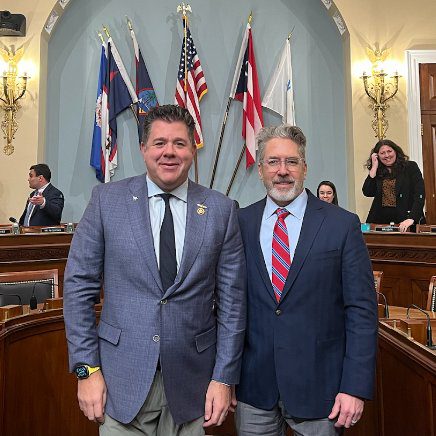LaLota fights for reauthorization of the Long Island Sound Restoration and Stewardship Act
By Samantha Rutt
In mid-January, U.S. Rep. Nick LaLota (R-NY1) appeared in Washington before the Natural Resources Committee to address the importance of the Long Island Sound Restoration and Stewardship Act. This bipartisan act would reauthorize the Long Island Sound Program through 2028 to ensure the protection and preservation of the Sound.
“The longevity and health of the Long Island Sound is critical for Long Island and Connecticut residents,” LaLota said before the committee. “For many, the Long Island Sound and our waterways are our way of life.”
The act was initially introduced by both LaLota and U.S. Rep. Joe Courtney of Connecticut (D-Vernon), co-chairs of the Long Island Sound Caucus, which focuses on issues relating to and impacting the Long Island Sound, including conservation, water, fishing, transportation and energy. The LISRSA will ensure the Sound remains a valuable resource for generations to come.
“As the co-chair of the Long Island Sound Caucus, I am proud to introduce the Long Island Sound Stewardship and Restoration Act. The Long Island Sound is not just a body of water, it’s a way of life for our community,” LaLota said in a 2023 statement. “This legislation underscores the vital importance of preserving this natural treasure, not only for our environment but for the thriving fishing industry that sustains Long Island’s economy. Together, we can ensure the continued health and prosperity of Long Island Sound, a resource that defines our region and sustains our livelihoods.”
This bill amends the Clean Water Act to include studies addressing environmental impacts on the Sound watershed, planning initiatives that identify areas best suited for various activities while maintaining minimal adverse environmental impacts, as well as to facilitate compatible uses, or preserve critical ecosystem services.
In adherence with the act, representatives must also develop and implement strategies to increase education and awareness about the ecological health and water quality of the Sound and monitor the progress made toward meeting the goals, actions and schedules of the plan.
In addition, the Environmental Protection Agency must coordinate the actions of all federal departments and agencies that impact the Sound’s water quality and to improve the water quality and living resources of the watershed.
“Pollution, overdevelopment, algae, water quality and dumping are just a few of the issues we have endured over the past several decades,” LaLota said. “The deterioration of the Sound and its natural habitats have also been an issue the Long Island Sound program has addressed, ensuring that endangered and native species can thrive in this environment.”
A federal agency that owns or occupies property, or carries out activities, within the Sound watershed are required to participate in regional and subwatershed planning, protection and restoration activities. Additionally, such agencies will be required to ensure that the property and activities are consistent with the plan to the maximum extent practicable.
Lastly, the reauthorization of the bill will further authorize the Long Island Sound Study, the Long Island Sound Stewardship Act of 2006, the Long Island Sound Grants and Long Island Sound Stewardship Grants through fiscal year 2028.
Upon his visit to the capital, LaLota also had the opportunity to question Chris Pickerell, the director of the Marine Program at Cornell Cooperative Extension of Suffolk County on the importance of reauthorizing the program.
Pickerell estimated “tens of thousands” of people on Long Island to be affected by the Sound and even more so from the Connecticut approach. After questioning from LaLota regarding benefits of a healthy watershed, Pickerell mentioned the several direct and indirect ways people living near the Sound would benefit from the renewal of the LISRSA.
“Recreation, commercial fishing, recreational fishing, aesthetics, boating, swimming, all those things, transportation, of course, the ferries,” Pickerell listed as some of the direct ways in which residents use the Sound.
“If the water quality was improved, that could actually impact people’s livelihoods, their jobs — whether it’s aquaculture or wild harvest of shellfish or finfish, that could increase and bring more money to those communities and to their families to put food on the table,” Pickerell added.
LaLota then proposed a situation in which the restoration program never existed, calling upon Pickerell to speculate what the Sound may look like without it.
“We wouldn’t see the milestones reached that have been achieved so far,” Pickerell said. “There have been so many projects of all different natures that are taking place that have helped to restore habitat, fisheries, recreation, education.”
Without the LISRSA funding, Pickerell noted, “we would go in reverse. The improvements that have happened would start to wane and we wouldn’t see any advancement.”
“I hope that it’s obvious to my colleagues here in Washington that the reauthorization of the Long Island Sound Program is vital to not only Long Islanders and Connecticut, but the environment and to the entire region,” LaLota said as his time in Washington came to a close.






